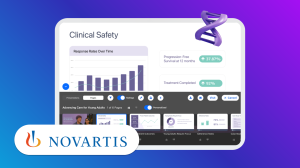AI agents are only as good as the data they’re able to access, but many organizations are still struggling to bring it all together.
The stakes rise as leaders push to deploy AI agents for productivity and efficiency. They quickly run into fragmented data scattered across platforms, repositories, and formats. As a result, CIOs find themselves spending 20% of their IT budgets on supporting data infrastructure, compared to just 5% on AI.
Dan O’Leary, senior director of partnerships at Box, an intelligent content management (ICM) platform provider, summed it up well:
“One of the biggest challenges we face today,” he said, “is figuring out how to pull all this data together. How do we do it securely? And how do we do it in a way that makes it accessible to agents and agentic processes? It’s hard if it’s in a hundred places, a hundred repositories, or in unstructured sources you can’t access.”
To overcome this inefficiency, many organizations are turning to Salesforce, tapping its digital labor platform, Agentforce, and its hyperscale data engine Data Cloud to deliver actionable insights grounded in real-time customer data and metadata. Other agents or copilots fall short because they lack the full access Data Cloud provides to structured and unstructured data in their data lakes, warehouses, and CRM systems.
Bridging healthcare data gaps
Unified data is particularly important in healthcare, where the difference between timely intervention and critical delay can be life-altering. Adobe Population Health, an innovative care management company, experienced this firsthand.
Delivering truly personalized care requires a comprehensive view of each patient, but doing so effectively is incredibly challenging with fragmented data, said Alex Waddell, CIO at Adobe Population Health.
“We really want to teach an agent what’s important for every individual member — what chronic conditions they have or what medications they need to be aware of,” Waddell said. “But we had data silos across our organization, and that prevented us from having key information when we needed it.”
By unifying its records with Data Cloud, Waddell said Adobe Population Health was able to ensure that it was using the right data to fuel its AI models.
You have to have your data in one place because if you (don’t), you might actually bring in data that is not useful or might be negative to your model.
Alex Waddell, Adobe Population Health
“You have to have your data in one place because if you (don’t), you might actually bring in data that is not useful or might be negative to your model,” he said. “So, I really think it’s important to look at something like Data Cloud, even if you’re an organization like Adobe Population Health who’s on a single platform, and ask, ‘What are we sending into the model?’ and be thoughtful about what we send so we can get thoughtful and useful responses.”
Automating services — at scale
For professional services firms, AI enhances human expertise by automating tasks.
Raju Malhotra, Chief Product and Technology Officer at Certinia, a cloud-based platform for services businesses, emphasized the need for a unified data foundation to optimize service delivery.
“The quality of experience and quality of decisions really comes down to the quality of data that we have,” Malhotra said. He pointed to Data Cloud’s role in creating a “single view of the customer,” which was essential for effective AI and quality customer engagements.
Certinia’s AI agents can help automate staffing decisions and improve customer success outcomes. For example, agents can handle real-time staffing adjustments and generate customer success reports — freeing humans to focus on more strategic client relationships.
“We have a customer success agent that proactively monitors the health of our customers’ customers,” streamlining engagement, Malhotra explained. Having a unified data layer is foundational to these capabilities, he added.
Centralizing data to enhance workflows
Organizations leading in AI adoption aren’t just implementing the technology — they’re building data strategies that enable it. That’s the case at Formstack, a workplace productivity platform provider. To make the most of Agentforce’s capabilities, Formstack relies on the unified data within Data Cloud to help automate document generation and streamline workflows.
“Data Cloud has that extremely powerful ability to just consume all of your data, centralize it, and integrate it everywhere,” said Marc-André Thériault, Formstack engineering manager.
Data Cloud has that extremely powerful ability to just consume all of your data, centralize it, and integrate it everywhere.
Marc-André Thériault, Formstack
This centralized data foundation allows Formstack to directly integrate agentic AI enhancements into existing Salesforce workflows.
“All of our customers are actually already in Salesforce,” Thériault said. “That’s where people are working. This is the tool that they open first thing in the morning and close last thing at night. So, being able to embed an AI agent that is powerful and trusted on top of that, to leverage all the flows, all the automations, all the Apex, but also all the data that they already have in the platform makes using Agentforce a no brainer.”
The smartest agents are useless without the right data behind them. As AI adoption accelerates, companies are increasingly realizing that great AI relies on great data.
More information:
- Learn why a deeply integrated platform is key to unlocking the agentic AI opportunity
- Find out how Data Cloud fuels agent-first enterprises
- Discover why AI models matter less than having a deeply unified platform
- Read why metadata is key to building a massive AI agent ecosystem

















